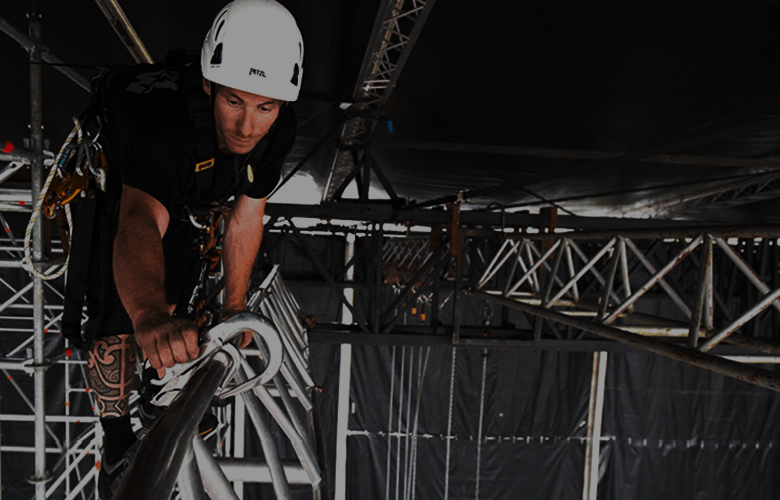
While many stage professionals are still concerned about the lack of work during the pandemic, we heard of some optimistic news that some countries have a step-by-step plan to open up the economy. Why not take this time to review the protective equipment and prepare yourself to get back to the stage? [Probably, it is on sale during this strange time]
A hard hat is generally required while constructing stages or if work is being done overhead. Many theatrical facilities are now seeing hard hats mandated as there is a great chance of head injury from the impact of falling or flying objects.
While working in a harness can slow you down, the consequences to your life by choosing not to wear one are not worth the risk. The fact is that the majority of injuries in the theatre industry are related to work at height.
According to OSHA, generally, the entertainment industry would be covered under the general industry standards, although there may be some construction jobs that would be required to follow the construction standards. This being said, safety harnesses are required when working at height in the theatre. You should always bear it in mind: Go Home Safe Every Day.
Durability and functionality are the key considerations for stagehands’ workwear trousers.
We want our trousers to be tough and enable good movement without fearing that any cracks will show when jumping, climbing and bending. A pair of trousers with reinforced crotch and thighs will never disappoint you. If you have to crawl around on stage or convention centre floors, you’ll never go wrong with trousers featuring good knee pads that provide all-day comfort and protect you from getting bruises.
Who doesn’t like multiple pockets that can hold every essential for working backstage? When choosing trousers, make sure the pockets are sturdy and sufficient for your tools including flashlights, multi-tools, tape, pens, and more. However, we recommend avoiding baggy trousers that could snag on a ladder and cause you to fall. A good recommendation for female stagehands: Thanks to greater awareness of female riggers’ demand at work; fitted, high-waist and slim-fit trousers are finally available on the market to specifically suit the female figure. These trousers, like their male counterparts, are also durable and functional with multiple strong pockets.
Hand protection is always associated with stage production. Without proper, snug fit safety gloves, all hard-working men and women can’t focus on the strenuous work at hand. It is always recommended to get gloves specifically designed for your work. For example, if you’re mainly responsible for general stage work like load-in, load-out and film/set/scenic, general-use rigger gloves will be sufficient. If, on the other hand, your work involves rope access and theatrical flying, a pair of professional rope gloves are needed to deliver a stronger level of hand protection.
Don’t forget to put your gloves on a carabiner for hanging on your toolbelt when you don’t need them, so you won’t lose them.
A useful tip for female riggers: Don’t rely on your company for safety gear as they usually provide you with male gloves. Their smallest size may still be baggy for your hands, making you uncomfortable all day and easily causing accidents at work.
You should have an array of wrenches, hex keys, rope, and a good pocket knife. A tool belt is extremely handy for keeping your most-used tools close by.
A pair of steel-toed shoes are important for all stagehands and stage technicians when setting up an event. Imagine when you’re within 20 feet of a road case or a piece of truss, steel-toed or composite-toe shoes will be something you need the most to protect your toes from heavy impacts. You may also consider high-ankle steel-toed boots or shoes since they offer better ankle support while also saving your toes from impact.
When there is a low risk of injury at work such as not many heavy/moving set pieces, you probably don’t need steel-toed boots as they aren’t very comfortable for general working. Black tennis shoes would be a more appropriate choice.
Jewellery and accessories will only distract you and your crew members, or even catch on things at the worst possible moments. Therefore, they shouldn’t be worn when working.
Female Stagehand: Equality…But Not Really
World Theatre Day 2020: Celebrate with Fun Facts


I am currently the SEO copywriter of Mountain Productions where I devote my work fulltime to writing event recaps and creating safety rigging content. Working in the largest staging company in North America allows me to experience amazing staging production work and learn best practices for staging environments.
Read Full Profile© 2021 TheatreArtLife. All rights reserved.

Thank you so much for reading, but you have now reached your free article limit for this month.
Our contributors are currently writing more articles for you to enjoy.
To keep reading, all you have to do is become a subscriber and then you can read unlimited articles anytime.
Your investment will help us continue to ignite connections across the globe in live entertainment and build this community for industry professionals.